Henry Cloud's Blog, page 4
December 13, 2019
How the Fear of Saying No Can Handicap Your Life
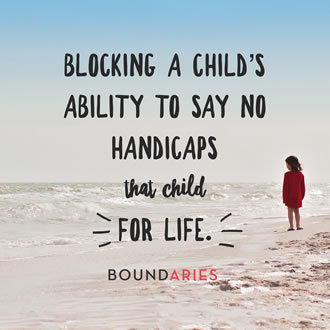 “May I tell you something embarrassing?” Robert asked me (Dr. Townsend). A new client, Robert was trying to understand why he had so much difficulty refusing his wife’s constant demands. He was going broke trying to keep up with the Joneses.
“May I tell you something embarrassing?” Robert asked me (Dr. Townsend). A new client, Robert was trying to understand why he had so much difficulty refusing his wife’s constant demands. He was going broke trying to keep up with the Joneses.
“I was the only boy in my family, the youngest of four children. There was a strange double standard in my house involving physical fighting.” Robert cleared his throat, struggling to continue. “My sisters were three to seven years older than me. Until I was in sixth grade, they were a lot bigger and stronger. They’d take advantage of their size and strength and wale on me until I was bruised. I mean, they really hurt me.
“The strangest part of it all was my parents’ attitude. They’d tell us, ‘Robert is the boy. Boys don’t hit girls. It’s bad manners.’ Bad manners! I was getting triple-teamed, and fighting back was bad manners?” Robert stopped. His shame kept him from continuing, but he’d said enough. He had unearthed part of the reason for his conflicts with his wife.
When parents teach children that setting boundaries or saying no is bad, they are teaching them that others can do with them as they wish. They are sending their children defenseless into a world that contains much evil. Evil in the form of controlling, manipulative, and exploitative people. Evil in the form of temptations.
To feel safe in such an evil world, children need to have the power to say things like:
“No.”
“I disagree.”
“I will not.”
“I choose not to.”
“Stop that.”
“It hurts.”
“It’s wrong.”
“That’s bad.”
“I don’t like it when you touch me there.”
Blocking a child’s ability to say no handicaps that child for life. Adults with handicaps like Robert’s have this first boundary injury: they say yes to bad things.
This type of boundary conflict is called compliance. Compliant people have fuzzy and indistinct boundaries; they “melt” into the demands and needs of other people. They can’t stand alone, distinct from people who want something from them. Compliants, for example, pretend to like the same restaurants and movies their friends do “just to get along.” They minimize their differences with others so as not to rock the boat. Compliants are chameleons. After a while it’s hard to distinguish them from their environment.
The inability to say no to the bad is pervasive. Not only does it keep us from refusing evil in our lives, it often keeps us from recognizing evil. Many compliant people realize too late that they’re in a dangerous or abusive relationship. Their spiritual and emotional “radar” is broken; they have no ability to guard their hearts (see Proverbs 4:23).
This type of boundary problem paralyzes people’s “no” muscles. Whenever they need to protect themselves by saying no, the word catches in their throats. This happens for a number of different reasons:
Fear of hurting the other person’s feelings
Fear of abandonment and separateness
A wish to be totally dependent on another
Fear of someone else’s anger
Fear of punishment
Fear of being shamed
Fear of being seen as bad or selfish
Fear of being unspiritual
Fear of one’s overstrict, critical conscience
This last fear is actually experienced as guilt. People who have an overstrict, critical conscience will condemn themselves for things God himself doesn’t condemn them for. As Paul says, “Since their conscience is weak, it is defiled” (see 1 Corinthians 8:7). Afraid to confront their unbiblical and critical internal parent, they tighten inappropriate boundaries.
When we give in to guilty feelings, we are complying with a harsh conscience. This fear of disobeying the harsh conscience translates into an inability to confront others—a saying yes to the bad—because it would cause more guilt.
Biblical compliance needs to be distinguished from this kind of compliance. Matthew 9:13 says that God desires “compassion, and not sacrifice.” In other words, God wants us to be compliant from the inside out (compassionate), not compliant on the outside and resentful on the inside (sacrificial). Compliants take on too many responsibilities and set too few boundaries, not by choice, but because they are afraid.
_________
If compliance has taken control over your life, find freedom by reading The New York Times bestseller Boundaries.
 Get The 10 Laws of Boundaries eBook when you subscribe to the Boundaries Weekly email newsletter. Learn More
Get The 10 Laws of Boundaries eBook when you subscribe to the Boundaries Weekly email newsletter. Learn More
The post How the Fear of Saying No Can Handicap Your Life appeared first on Boundaries Books.
December 10, 2019
God, the Bible, and Boundaries
 When some people read the Bible, they see a book of rules, do’s and don’ts. When others read it, they see a philosophy of life, principles for the wise. Still others see mythology, stories about the nature of human existence and the human dilemma.
When some people read the Bible, they see a book of rules, do’s and don’ts. When others read it, they see a philosophy of life, principles for the wise. Still others see mythology, stories about the nature of human existence and the human dilemma.
Certainly, the Bible contains rules, principles, and stories that explain what it is like to exist on this earth. But to us, the Bible is a living book about relationship. Relationship of God to people, people to God, and people to each other. It is about a God who created this world, placed people in it, related to people, lost that relationship, and continues to heal that relationship. It is about God as creator: this is his creation. It is about God as ruler: he ultimately controls his world and will govern it. And it is about God as redeemer: he finds, saves, and heals his loved ones who are lost and in bondage.
When a lawyer asked Jesus which was the greatest commandment in the Law, Jesus said to him, “‘Love the Lord your God with all your heart and with all your soul and with all your mind.’ This is the first and greatest commandment. And the second is like it: ‘Love your neighbor as yourself.’ All the Law and the Prophets hang on these two commandments” (Matt. 22:37 – 40). The entire Scripture communicates a message of love. “Love God, and love your neighbor as yourself.”
But how do we do that? Well, that’s why there are so many other passages! Loving God and our neighbor is difficult. One of the main reasons it’s so difficult is because of boundary problems, which are essentially problems of responsibility. We do not know who is responsible for what, where we end and someone else begins, where God ends and we begin. The Bible clarifies those boundaries so that we can begin to see who should do what in this labor of love.
Respecting Boundaries
We have personal boundaries, personal property lines, in our relationship with God. God has designed the world so that boundaries are to be respected. He respects ours, and we need to respect his.
God respects our boundaries in many ways. First, he leaves work for us to do that only we can do. And he allows us to experience the painful consequences of our behavior so that we will change. He is not willing for any of us to perish and takes no pleasure in our destruction (2 Peter 3:9; Ezek. 18:23), but he wants us to change for our own good and his glory. It hurts him deeply when we don’t. But at the same time, he does not rescue us; he wants us to work it out for our own good. He will not violate our wish to be left alone, although he will plead with us to come back to him.
Second, he respects our no. He tries neither to control nor nag us. He allows us to say no and go our way. Think of the parable of the prodigal son, the story of the rich young ruler, or the story of Joshua and his people. In all of these examples, God gives a choice and allows the people involved to make up their minds. When people say no, he allows it and keeps on loving them. He is a giver. And one of the things he always gives is a choice, but like a real giver, he also gives the consequences of those choices. He respects boundaries.
Respecting God’s Boundaries
God expects his boundaries to be respected as well. When he makes choices, or says no to us, that is his right, his freedom. If we are to have a real relationship with him, we need to respect that freedom. When we try and put him into binds where he “has to do something,” we are testing his freedom. When we are angry with him for what he does not do, we are not allowing him the freedom to be who he is.
The basic problem in human relationship is that of freedom. We call people bad because they do not do what we want them to do. We judge them for being themselves, for fulfilling their wishes. We withdraw love from them when they do what they feel is best for them, but it is not what we want them to do.
We do the same thing with God. We feel entitled to God’s favor, as if he has to do what we want him to. How do you feel when someone asks you for a favor but does not give you a free choice? This childish entitlement gets many people dissatisfied with God the same way that they are dissatisfied with others in their lives. They hate the freedom of others.
God is free from us. When he does something for us, he does it out of choice. He is not “under compulsion” or guilt or manipulation. He does things, like dying for us, because he wants to. We can rest in his pure love; he has no hidden resentment in what he does. His freedom allows him to love.
In the same way that we want others to respect our no, God wants us to respect his. He does not want us to make him the bad guy when he makes a choice. We do not like others trying to manipulate or control us with guilt, and neither does he.
A Real Relationship
Then again, God does not want us to be passive in our relationship with him either. Sometimes, through dialogue, he changes his mind. We can influence him because ours is a real relationship of the kind Abraham had with God (Gen. 18:16 – 33). God said that he would destroy Sodom, yet Abraham talked him out of it if he could find ten righteous people.
When we make our feelings and wishes known, God responds. We do not often think of God this way, but the Bible is clear. It is as though God says, “If it really means that much to you, it’s okay with me.” One of the most astounding teachings of the Bible is that we can influence God. It wouldn’t be a real relationship if we couldn’t. “ ‘Come now, let us reason together,’ says the LORD” (Isa. 1:18). Like a real friend, or a real father, he says, “Let me hear your side of things and I will consider them. They matter to me. Maybe you can convince me to change my mind.”
God wants us to respect his boundaries; he doesn’t want us to withdraw our love when he says no. But he has nothing at all against our trying to persuade him to change his mind. In fact, he asks for us to be tenacious. Often he says, “Wait,” seeing how much we really want something. Other times, it seems he changes his mind as a result of our relationship with him. Either way, we respect his wishes and stay in relationship.
Boundaries are inherent in any relationship God has created, for they define the two parties who are loving each other. In this sense, boundaries between us and God are very important. They are not to do away with the fundamental oneness or unity that we have with him (John 17:20 – 23), but they are to define the two parties in unity. There is no unity without distinct identities, and boundaries define the distinct identities involved.
We need to know these boundaries between us and him. Boundaries help us to be the best we can be — in God’s image. They let us see God as he really is. They enable us to negotiate life, fulfilling our responsibilities and requirements. If we are trying to do his work for him, we will fail. If we are wishing for him to do our work for us, he will refuse. But if we do our work, and God does his, we will find strength in a real relationship with our Creator.
________
From The New York Times bestseller Boundaries by Dr. Henry Cloud and Dr. John Townsend. Learn More

December 6, 2019
When Negatives Are Really Positives
 Written by Dr. John Townsend, exclusive to BoundariesBooks.com
Written by Dr. John Townsend, exclusive to BoundariesBooks.com
People who have a hard time setting limits in their relationships often are concerned about their effect. They don’t want to be negative with others. For example, a wife with a controlling husband may be afraid he will become angry if she says no to his control. A father may fear alienating his adult child when he sets a time limit on how long he can live at home. Or a boss may be concerned about morale dropping if he has to have a tough talk with a key employee. As a result, they often postpone the talks that need to happen.
It is true that confronting problems and setting limits is not a “positive” experience. That is, it involves some difficult talks and actions that feel negative in nature. People can react in defensive, angry or hurt ways. However, just because something feels negative at the time doesn’t mean it will have a negative outcome.
A “no” can often result in a problem solved. Speaking the truth in love (see Ephesians 4:15) and setting an appropriate limit may result in very healthy outcomes. The husband gets defensive, then in time sees that he is not being loving to his wife, and changes. The adult child becomes resentful, then moves out and gets a job and finds his own apartment. The key employee doesn’t have a great response to the confrontation, but then changes his behavior and things go better at work.
On the other hand, avoiding the negative can actually increase our misery. The husband, the adult child and the employee continue in their behaviors, and things can get worse, with no realistic hope that matters will improve.
God calls this sowing and reaping: “Do not be deceived: God cannot be mocked. A man reaps what he sows” (see Galatians 6:7). If we sow honesty and healthy boundaries, it may not be fun, but it should reap improved relationships, more freedom and solved problems. Sowing these healthy “negatives” will in time reap healthy positive outcomes.
Have courage. Face that tough talk and set some healthy limits. And pray for God to help you be patient for the reaping you need.
________
Learn more about setting boundaries from the New York Times bestseller Boundaries by Dr. Henry Cloud and Dr. John Townsend. Learn More

December 2, 2019
When Setting Boundaries Feels Scary
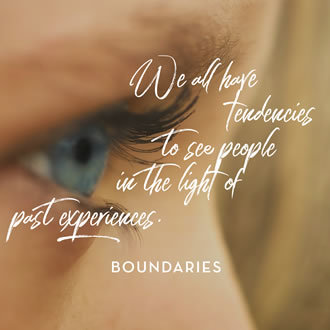 A woman came to see me (Dr. Cloud) once for help in her marriage. She described her husband as so “powerful” and “intimidating” she just could not find it in herself to talk to him about things bothering her.
A woman came to see me (Dr. Cloud) once for help in her marriage. She described her husband as so “powerful” and “intimidating” she just could not find it in herself to talk to him about things bothering her.
“Why don’t you just talk to him about these things?” I asked.
“Oh, I just couldn’t do that,” she would reply. “He’s too strong. He’s so intimidating. I just don’t know what to do.”
After seeing I wasn’t getting anywhere by suggesting she talk to her husband, I asked her if her husband would come in to see me. She said she would tell him I would like to talk to him. I had no idea what I was in for.
On the day of her next appointment, I went into the waiting room to find the woman sitting there with a small, frail-looking man. He stood and said, in one of the least intimidating, squirrelly little voices I had ever heard, “Hi, Dr. Cloud. It is so nice to meet you!” I remember describing him later as “mousy.” He came across as just a whisper of a person.
I could see immediately that his wife and I had some work to do. I had to help her see where her distorted view of her husband as powerful and intimidating came from. After much work in counseling, we discovered that as a result of growing up with a powerful, intimidating, “unconfrontable” father, this woman saw all men she needed in the same way. She had never worked through her tendency to distort.
We all have such “transferences,” or tendencies to see people in light of past experiences. We distort authority figures, men, women, romantic ties, people’s neediness, and their imperfections.
In dating relationships, a woman will sometimes so idealize her boyfriend that she cannot even see the problems that need confronting. She idealizes him to the extent that she does not confront ongoing problems, and then there is a big blowup later. Or the “idealized” one loses interest because he has so much power in the relationship. Whenever someone is too idealized, the power imbalance is destructive to the connection; it will ultimately break down.
In some organizations, followers sometimes so idealize their leaders that they do not deal with ongoing issues and problems with them, then later they hate the leaders when they fail. The proverbial “other shoe” drops, and we find that the idealization covered up much anger and many problems. In the same way, we see others as “all bad” at times, and far from idealizing them, we have difficulty seeing their good points. In this situation, a confrontation becomes a lynching. The distortion arouses destructive rage, which is directed at the person who is “all bad” in the confronter’s eyes. (This happens in many romantic breakups, too.)
Another very common scenario is one in which someone who has been enabling another person is afraid to set limits because she fears it will destroy the person who is so “weak.” Obviously, when someone is in a vulnerable position, confrontation is not a good idea. If it could put the person “over the edge,” or if he truly would not be able to take care of himself, to cut him off would be cruel. But in many situations, a family is enabling someone to stay sick and dependent because they see him as too weak and unable. It is often time to clear up that distortion and see him as a fat little bird who needs to be pushed out of the nest so that he can learn to fly.
The point is this: Obtain a realistic view of the person you are talking to, and be aware of your tendencies to do the following:
Idealize and romanticize
See as “all good” or “all bad”
See as overly powerful
See as overly needy or fragile
See as a parental authority figure
As you become aware of your distortions, look also at the behaviors and choices these distortions lead you to make, and use that awareness to make the changes you need to make.
________
Don’t let fear prevent you from being yourself and building the best relationships possible. You can set limits with other people and still be a loving person. Read The New York Times bestseller, Boundaries, and learn when to say yes and how to say no in any situation. Learn More

November 15, 2019
Adults: Do Not Obey Your Parents
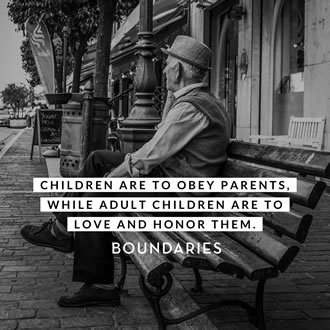 As an adult, loving and honoring your parents does not equal obeying. God placed you with your parents for a season of time to help you grow into a mature adult. At some point this season ends, and your relationship with your mom and dad changes from child-to-parent to adult-to-adult. The roles change from dependency and authority to mutuality. While you are to respect and care for your parents, you are no longer under their protection and tutelage. Children are to obey parents, while adult children are to love and honor them. Therefore, sometimes you will need to confront parents, disobeying their desire for you to agree with them or go along with a bad situation.
As an adult, loving and honoring your parents does not equal obeying. God placed you with your parents for a season of time to help you grow into a mature adult. At some point this season ends, and your relationship with your mom and dad changes from child-to-parent to adult-to-adult. The roles change from dependency and authority to mutuality. While you are to respect and care for your parents, you are no longer under their protection and tutelage. Children are to obey parents, while adult children are to love and honor them. Therefore, sometimes you will need to confront parents, disobeying their desire for you to agree with them or go along with a bad situation.
People often have difficulty confronting parents, because they still feel like a little child with them. Emotionally they have not left home, so they do not feel free to be separate, truthful, and honest with them. There is too much to lose. If this sounds like you, it might be very helpful to work on these issues in a small-group setting or with a counselor in order to free yourself up from the past so that you can be an adult in the present.
________
Click to Tweet: Children are to obey parents, while adult children are to love and honor them.
________
One concrete example of moving out of obedience and dependence on parents happens when you decide that you will not spend some traditional holiday time with your parents. This can often be a cause for a confrontational talk:
You: “Mom, I wanted to let you know as soon as I could that I’ve made plans to go to the mountains with some friends this Christmas. I know this will be the first Christmas I won’t be with you and Dad, so I wanted to talk to you about it.”
Mom: “What are you talking about? You always spend Christmas with us. Your father will be so hurt.”
You: “I’m so sorry you feel that way. I would never want to hurt you. But this year I have a really good group of friends from my singles group at church that I want to spend the holidays with. It’s not about not caring about you; it’s about wanting to be involved with these people at a deeper level.”
Mom: “Can’t you do that at another time? I mean, it will ruin our holiday.”
You: I hope it doesn’t ruin things for you. That’s why I’m telling you this several months in advance, so you can make sure you have time to make any other arrangements you need to so your holiday will be good.
Mom: “Don’t you care about how we feel?”
You: “Yes, Mom, I care very much. And I do like spending time with you. If you think that I don’t care, then maybe we can talk at some other point about your feelings, because I would like to reassure you that I care. But the point of this phone call was simply to give you a heads up so that we can plan and adjust for this change.”
In addition, don’t forget that your parent may need for you to be a change agent in her life. You may be one of the few people in her circle who is aware of her hurtful behavior or attitude. So, just as her job was to correct you in years past, your job (without the parental authority role) may be to correct her in the present. I know of many situations in which an adult child’s confrontation of a parent was life changing for both.
________
The award-winning book, Boundaries, includes specific chapters dedicated to helping you solve problems with your family, children, spouse, friends, and co-workers. Learn how to set effective limits and still be a loving person. Learn More
 Get The 10 Laws of Boundaries eBook when you subscribe to the Boundaries Weekly email newsletter. Learn More
Get The 10 Laws of Boundaries eBook when you subscribe to the Boundaries Weekly email newsletter. Learn More
The post Adults: Do Not Obey Your Parents appeared first on Boundaries Books.
November 11, 2019
Are You Carrying Someone Else’s Knapsack?
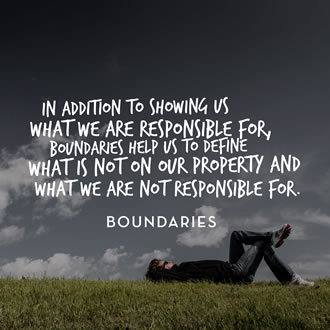 We are responsible to others and for ourselves. “Carry each other’s burdens,” says Galatians 6:2, “and in this way you will fulfill the law of Christ.” This verse shows our responsibility to one another.
We are responsible to others and for ourselves. “Carry each other’s burdens,” says Galatians 6:2, “and in this way you will fulfill the law of Christ.” This verse shows our responsibility to one another.
Many times, others have “burdens” that are too big to bear. They do not have enough strength, resources, or knowledge to carry the load, and they need help. Denying ourselves to do for others what they cannot do for themselves is showing the sacrificial love of Christ. This is what Christ did for us. He did what we could not do for ourselves; he saved us. This is being responsible “to.”
On the other hand, Galatians 6:5 says that “each one should carry his own load.” Everyone has responsibilities that only he or she can carry. These things are our own particular “load” that we need to take daily responsibility for and work out. No one can do certain things for us. We have to take ownership of certain aspects of life that are our own “load.”
The Greek words for burden and load give us insight into the meaning of these texts. The Greek word for burden means “excess burdens,” or burdens that are so heavy that they weigh us down. These burdens are like boulders. They can crush us. We shouldn’t be expected to carry a boulder by ourselves! It would break our backs. We need help with the boulders — those times of crisis and tragedy in our lives.
In contrast, the Greek word for load means “cargo,” or “the burden of daily toil.” This word describes the everyday things we all need to do. These loads are like knapsacks. Knapsacks are possible to carry. We are expected to carry our own. We are expected to deal with our own feelings, attitudes, and behaviors, as well as the responsibilities God has given to each one of us, even though it takes effort.
________
Click to Tweet: In addition to showing us what we are responsible for, boundaries help us to define what is not on our property and what we are not responsible for.
________
Problems arise when people act as if their “boulders” are daily loads, and refuse help, or as if their “daily loads” are boulders they shouldn’t have to carry. The results of these two instances are either perpetual pain or irresponsibility.
Lest we stay in pain or become irresponsible, it is very important to determine what “me” is, where my boundary of responsibility is and where someone else’s begins. The Bible tells us clearly what our parameters are and how to protect them, but often our family, or other past relationships, confuses us about our parameters.
In addition to showing us what we are responsible for, boundaries help us to define what is not on our property and what we are not responsible for. We are not, for example, responsible for other people. Nowhere are we commanded to have “other-control,” although we spend a lot of time and energy trying to get it!
________
Learn the difference between burdens and boulders in The New York Times bestseller, Boundaries. You can set limits with other people and still be a loving person. Discover when to say yes and how to say no in any situation. Learn More
 Get The 10 Laws of Boundaries eBook when you subscribe to the Boundaries Weekly email newsletter. Learn More
Get The 10 Laws of Boundaries eBook when you subscribe to the Boundaries Weekly email newsletter. Learn More
The post Are You Carrying Someone Else’s Knapsack? appeared first on Boundaries Books.
November 8, 2019
How to Set Holiday Boundaries with Family
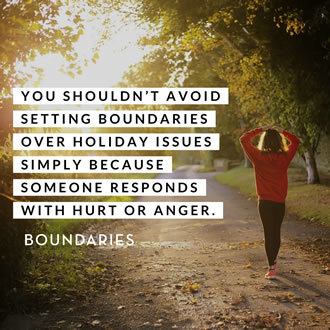 When you were born, God placed you into a family for a season of time to help you grow into a mature adult. At some point this season ends, and your relationship with your parents changes from child-to-parent to adult-to-adult. The roles change from dependency and authority to mutuality. While you are to respect and care for your mother and father, you are no longer under their protection and tutelage. Children are to obey parents, while adult children are to love and honor them. Therefore, situations will occur where you need to make decisions and set boundaries with family with which they may not agree.
When you were born, God placed you into a family for a season of time to help you grow into a mature adult. At some point this season ends, and your relationship with your parents changes from child-to-parent to adult-to-adult. The roles change from dependency and authority to mutuality. While you are to respect and care for your mother and father, you are no longer under their protection and tutelage. Children are to obey parents, while adult children are to love and honor them. Therefore, situations will occur where you need to make decisions and set boundaries with family with which they may not agree.
For example, you might decide to spend some traditional holiday time apart from your family. This can often be a cause for a confrontational talk:
You: “Mom, I wanted to let you know as soon as I could that I’ve made plans to go to the mountains with some friends this Christmas. I know this will be the first Christmas I won’t be with you and Dad, so I wanted to talk to you about it.”
Mom: “What are you talking about? You always spend Christmas with us. Your father will be so hurt.”
You: “I’m so sorry you feel that way. I would never want to hurt you. But this year I have a really good group of friends that I want to spend the holidays with. It’s not about not caring about you; it’s about wanting to be involved with these people at a deeper level. I’m looking forward to being with you on your birthday soon.”
Mom: “Can’t you do that at another time? I mean, it will ruin our Christmas.”
You: “I hope it doesn’t ruin things for you. That’s why I’m telling you this several months in advance, so you can make sure you have time to make any other arrangements you need to so your holiday will be good.”
Mom: “Don’t you care about how we feel?”
You: “Yes, Mom, I care very much. And I do like spending time with you. If you think that I don’t care, then maybe we can talk at some other point about your feelings, because I would like to reassure you that I care. But the point of this phone call was simply to give you a heads up so that we can plan and adjust for this change.”
Distinguish Between Hurt and Harm
Ultimately, you may have to distinguish between hurting and harming your family. You might cause your parent or relative discomfort in the conversation, which hurts, or you might say something unkind or unloving, which harms. The truth you want to communicate may be painful for your family (hurt them), but it will not injure them (harm them). Some adult children perceive their family members as fragile and brittle, and they do not confront needed problems because they fear any hurt will injure them.
________
Click to Tweet: You shouldn’t avoid setting boundaries over holiday issues because someone responds with hurt or anger.
________
Give your family time and space to evaluate their reactions, and see if they are being hurt or harmed. If they are angry or somewhat pouty, that is one thing. But if they seem more deeply affected—for example, withdrawing from the relationship due to pain, rather than in a manipulative “Look what you did to me” way—that is another thing. Consult with others who know your family to see whether they are genuinely unable to digest feedback without injury or is merely reacting.
You shouldn’t avoid setting boundaries over holiday issues because someone responds with hurt or anger. Deciding to set boundaries is difficult because it requires decision making and confrontation, which, in turn, may cause pain to someone you love. We need to evaluate the pain caused by our making choices and empathize with it.
Take Sandy, for example. Sandy chose to go skiing with friends instead of going home for Christmas vacation. Her mother was sad and disappointed, but she was not harmed. Sandy’s decision caused sadness, but her mother’s sadness should not cause Sandy to change her mind. A loving response to her mother’s hurt would be, “Oh, Mom, I’m sad that we won’t be together too. I’m looking forward to next summer’s visit.”
If Sandy’s mother respected her freedom to make choices, she would say something like this: “I’m so disappointed that you’re not coming home for Christmas, but I hope you all have a great time.” She would be owning her disappointment and respecting Sandy’s choice to spend her time with friends.
We need to evaluate the pain our decisions cause other people. We need to see how this hurt is helpful to others and sometimes the best thing we can do for them and the relationship. As adults, we are to respect our family, but we are no longer under their authority. The holidays represent unique challenges where you may make a decision that your family dislikes. But, as you and your family give the freedom to make your own choices, genuine love can be expressed that works to strengthen your relationship.
________
Yes, you can set healthy boundaries with family members, and we can help. With over 2 million copies sold, Boundaries is the best resource for learning how to set limits and make wise decisions in any relationship. Learn More

November 4, 2019
How to Forgive When It’s Hard to Forget
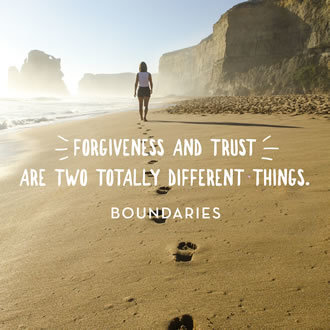 “I know I’m supposed to forgive,” a woman said to me (Dr. Cloud) at a recent seminar. “But, I just can’t open myself up to that kind of hurt anymore. I know I should forgive him and trust him, but if I let him back in, the same thing will happen, and I can’t go through that again.”
“I know I’m supposed to forgive,” a woman said to me (Dr. Cloud) at a recent seminar. “But, I just can’t open myself up to that kind of hurt anymore. I know I should forgive him and trust him, but if I let him back in, the same thing will happen, and I can’t go through that again.”
“Who said anything about ‘trusting’ him?” I asked. “I don’t think you should trust him either.”
“But you said I was supposed to forgive him, and if I do that, doesn’t that mean giving him another chance? Don’t I have to open up to him again?”
“No, you don’t,” I replied. “Forgiveness and trust are two totally different things. In fact, that’s part of your problem. Every time he’s done this, he’s come back and apologized, and you have just accepted him right back into your life, and nothing has changed. You trusted him, nothing was different, and he did it again. I don’t think that’s wise.”
“Well,” she asked, “How can I forgive him without opening myself up to being hurt again?”
________
Click to Tweet: Forgiveness and trust are two totally different things.
________
Good question. We hear this problem over and over again. People have been hurt, and they do one of two things. Either they confront the other person about something that has happened, the other person says he’s sorry, and they forgive, open themselves up again, and blindly trust. Or, in fear of opening themselves up again, they avoid the conversation altogether and hold onto the hurt, fearing that forgiveness will make them vulnerable once again.
How do you resolve this dilemma?
The simplest way to help you to organize your thoughts as you confront this problem is to remember three points:
1. Forgiveness has to do with the past. Forgiveness is not holding something someone has done against her. It is letting it go. It only takes one to offer forgiveness. And just as God has offered forgiveness to everyone, we are expected to do the same (see Matthew 6:12 and 18:35).
2. Reconciliation has to do with the present. It occurs when the other person apologizes and accepts forgiveness. It takes two to reconcile.
3. Trust has to do with the future. It deals with both what you will risk happening again and what you will open yourself up to. A person must show through his actions that he is trustworthy before you trust him again (see Matthew 3:8; Proverbs 4:23).
You could have a conversation that deals with two of these issues, or all three. In some good boundary conversations, you forgive the other person for the past, reconcile in the present, and then discuss what the limits of trust will be in the future. The main point is this: Keep the future clearly differentiated from the past.
As you discuss the future, you clearly delineate what your expectations are, what limits you will set, what the conditions will be, or what the consequences (good or bad) of various actions will be. As the proverb says, “A righteous man is cautious in friendship” (see Proverbs 12:26). Differentiating between forgiveness and trust does a number of things:
First, you prevent the other person from being able to say that not opening up again means you are “holding it against me.”
Second, you draw a clear line from the past to the possibility of a good future with a new beginning point of today, with a new plan and new expectations. If you have had flimsy boundaries in the past, you are sending a clear message that you are going to do things differently in the future.
Third, you give the relationship a new opportunity to go forward. You can make a new plan, with the other person potentially feeling cleansed and feeling as though the past will not be used to shame or hurt him. As a forgiven person, he can become an enthusiastic partner in the future of the relationship instead of a guilty convict trying to work his way out of relational purgatory. And you can feel free, not burdened by bitterness and punitive feelings, while at the same time being wise about the future.
________
Taken from The New York Times bestselling book Boundaries. Learn more about this incredibly helpful resource.
 Get The 10 Laws of Boundaries eBook when you subscribe to the Boundaries Weekly email newsletter. Learn More
Get The 10 Laws of Boundaries eBook when you subscribe to the Boundaries Weekly email newsletter. Learn More
The post How to Forgive When It’s Hard to Forget appeared first on Boundaries Books.
October 28, 2019
Is Complying Out of Fear the Same as Lying?
 Many Christians fear that setting and keeping limits signals rebellion or disobedience. In religious circles you’ll often hear statements such as, “Your unwillingness to go along with our program shows an unresponsive heart.” Because of this myth, countless individuals remain trapped in endless activities of no genuine spiritual and emotional value.
Many Christians fear that setting and keeping limits signals rebellion or disobedience. In religious circles you’ll often hear statements such as, “Your unwillingness to go along with our program shows an unresponsive heart.” Because of this myth, countless individuals remain trapped in endless activities of no genuine spiritual and emotional value.
The truth is life-changing: a lack of boundaries is often a sign of disobedience. People who have shaky limits are often compliant on the outside, but rebellious and resentful on the inside. They would like to be able to say no, but are afraid. So they cover their fear with a half-hearted yes.
Take Barry for example. He had almost made it to his car after church when Ken caught up with him. Here goes, Barry thought. Maybe I can still get out of this one.
“Barry!” Ken boomed. “Glad I caught you!” The singles class officer in charge of Bible studies, Ken was a dedicated recruiter to the studies he presided over; however, he was often insensitive to the fact that not everyone wanted to attend his meetings. “So which study can I put you down for, Barry? The one on prophecy, evangelism, or the book of Mark?”
Barry thought desperately to himself. I could say, “None of the above interest me. Don’t call me—I’ll call you.” But Ken is a ranking officer in the singles class. He could jeopardize my relationships with others in the group. I wonder which class will be the shortest?
“How about the one on prophecy?” Barry guessed. He was wrong.
“Great! We’ll be studying end times for the next 18 months! See you Monday.” Ken walked off triumphantly.
Let’s take a look at what just happened. Barry avoided saying no to Ken. At first glance, it looks like he made a choice for obedience. He committed himself to a Bible study. That’s a good thing, right? Absolutely.
But take a second look. What were Barry’s motives for not saying no to Ken? What were the thoughts and attitudes of his heart? Fear. Barry was afraid of Ken’s political clout in the singles group. He feared that he would lose other relationships if he disappointed Ken.
Why is this important? Because it illustrates a biblical principle: an internal no nullifies an external yes.
God is more concerned with our hearts than he is with our outward compliance. “For I desire mercy, not sacrifice, and acknowledgment of God rather than burnt offerings” (Hosea 6:6).
________
Click to Tweet: When we are afraid to say no, our yes is compromised.
________
In other words, if we say yes to God or anyone else when we really mean no, we move into a position of compliance. And that is the same as lying. Our lips say yes, but our hearts (and often our half-hearted actions) say no. Do you really think Barry will finish out his 18 months with Ken’s Bible study? The odds are that some priority will arise to sabotage Barry’s commitment, and he’ll leave — but without telling Ken the real reason why.
Here’s a good way to look at this myth that boundaries are a sign of disobedience: If we can’t say no, we can’t say yes. Why is this? It has to do with our motivation to obey, to love, or to be responsible. We must always say yes out of a heart of love. When our motive is fear, we love not.
The Bible tells us how to be obedient in 2 Corinthians 9:7, “Each of you must give as you have made up your mind, not reluctantly or under compulsion, for God loves a cheerful giver.”
Look at the first two ways of giving: “reluctantly” and “under compulsion.” They both involve fear—either of a real person or a guilty conscience. These motives can’t exist side by side with love, because “There is no fear in love; but perfect love casts our fear” (1 John 4:18). Each of us must give as we have made up our minds. When we are afraid to say no, our yes is compromised.
God has no interest in our obeying out of fear because, “Fear has to do with punishment. The one who fears is not made perfect in love” (1 John 4:18). God wants a response of love.
Are boundaries a sign of disobedience? They can be. We can say no to good things for wrong reasons. But having a “no” helps us to clarify, to be honest, to tell the truth about our motives; then we can allow God to work in us. This process cannot be accomplished in a fearful heart.
________
Is it possible to set limits and still be a loving person? Absolutely! You don’t have to be controlled by fear or guilt. Read the New York Times bestselling book, Boundaries. In it, Drs. Henry Cloud and John Townsend provide practical, biblically-based solutions for the digital age that help enhance all of your relationships.
 Get The 10 Laws of Boundaries eBook when you subscribe to the Boundaries Weekly email newsletter. Learn More
Get The 10 Laws of Boundaries eBook when you subscribe to the Boundaries Weekly email newsletter. Learn More
The post Is Complying Out of Fear the Same as Lying? appeared first on Boundaries Books.
October 22, 2019
When Someone Responds to Your Boundaries with Anger
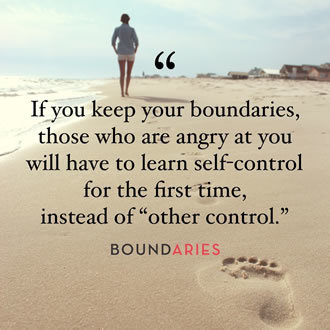 When you establish a new boundary with someone else, the most common form of resistance one gets is anger. People who get angry at others for setting boundaries have a character problem. Self-centered, they think the world exists for them and their comfort. They see others as extensions of themselves.
When you establish a new boundary with someone else, the most common form of resistance one gets is anger. People who get angry at others for setting boundaries have a character problem. Self-centered, they think the world exists for them and their comfort. They see others as extensions of themselves.
When they hear the word “no,” they have the same reaction a two-year-old has when deprived of something: “Bad Mommy!” They feel as though the one who deprives them of their wishes is “bad,” and they become angry. They are not righteously angry at a real offense. Nothing has been done “to them” at all. Someone will not do something “for them.” Their wish is being frustrated, and they get angry because they have not learned to delay gratification or to respect others’ freedom.
The angry person has a character problem. If you reinforce this character problem, it will return tomorrow and the next day in other situations. It is not the situation that’s making the person angry, but the feeling that they are entitled to things from others. They want to control others and, as a result, they have no control over themselves. So, when they lose their wished-for control over someone, they “lose it.” They get angry. Here are six steps to consider when someone responds with anger:
1. Realize that the person who is angry at you for setting boundaries is the one with the problem. If you do not realize this, you may think you have a problem. Maintaining your boundaries is good for other people; it will help them learn what their families of origin did not teach them: to respect other people.
2. View anger realistically. Anger is only a feeling inside the other person. It cannot jump across the room and hurt you. It cannot “get inside” you unless you allow it. Staying separate from another’s anger is vitally important. Let the anger be in the other person. He will have to feel his anger to get better. If you either rescue him from it, or take it on yourself, the angry person will not get better and you will be in bondage.
3. Do not let anger be a cue for you to do something. People without boundaries respond automatically to the anger of others. They rescue, seek approval, or get angry themselves. There is great power in inactivity. Do not let an out-of-control person be the cue for you to change your course. Just allow him to be angry and decide for yourself what you need to do.
4. Make sure you have your support system in place. If you are going to set some limits with a person who has controlled you with anger, talk to the people in your support system first and make a plan. Know what you will say. Anticipate what the angry person will say, and plan your reaction. You may even want to role-play the situation with your group. Then, make sure your support group will be available to you right after the confrontation. Perhaps some members of your support group can go with you. But certainly you will need them afterward to keep you from crumbling under the pressure.
5. Do not allow the angry person to get you angry. Keep a loving stance while “speaking the truth in love.” When we get caught up in the “eye for eye” mentality of the law, or the “returning evil for evil” mentality of the world, we will be in bondage. If we have boundaries, we will be separate enough to love.
6. Be prepared to use physical distance and other limits that enforce consequences. One woman’s life was changed when she realized that she could say, “I will not allow myself to be yelled at. I will go into the other room until you decide you can talk about this without attacking me. When you can do that, I will talk to you.”
________
Click to Tweet: If you keep your boundaries, those who are angry at you will have to learn self-control for the first time, instead of “other control.”
________
These serious steps do not need to be taken with anger. You can empathize lovingly and stay in the conversation, without giving in or being controlled. “I understand that you are upset that I will not do that for you. I am sorry you feel that way. How can I help?” Just remember that when you empathize, changing your no will not help. Offer other options.
If you keep your boundaries, those who are angry at you will have to learn self-control for the first time, instead of “other control,” which has been destructive to them anyway. When they no longer have control over you, they will find a different way to relate. But, as long as they can control you with their anger, they will not change.
Sometimes, the hard truth is that they will not talk to you anymore, or they will leave the relationship if they can no longer control you. This is a true risk. God takes this risk every day. He says that he will only do things the right way and that he will not participate in evil. And when people choose their own ways, he lets them go. Sometimes we have to do the same.
_________
Learn more about setting healthy boundaries that last in the New York Times bestselling book, Boundaries.
 Get The 10 Laws of Boundaries eBook when you subscribe to the Boundaries Weekly email newsletter. Learn More
Get The 10 Laws of Boundaries eBook when you subscribe to the Boundaries Weekly email newsletter. Learn More
The post When Someone Responds to Your Boundaries with Anger appeared first on Boundaries Books.



